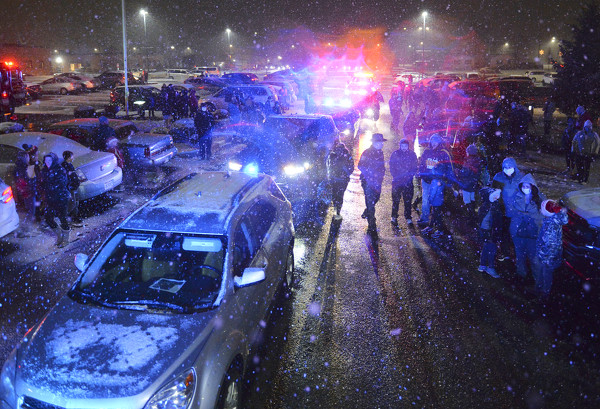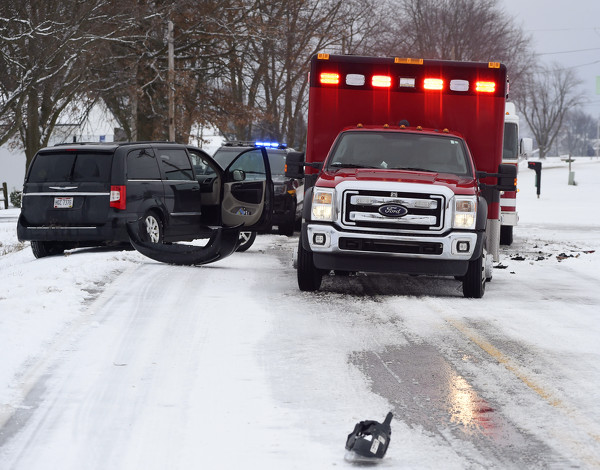Thursday, December 17th, 2020
Coming soon: Christmas vaccination
Authorities prep for arrival of 1st COVID vaccines
By Leslie Gartrell
CELINA - Mercer County Health District and Mercer County Community Hospital officials are preparing for the arrival of the first COVID-19 vaccines.
Health district administrator Jason Menchhofer at the board's Wednesday meeting said he is anticipating 200 doses of the Moderna vaccine in the first shipment. The shipment could arrive next week if the Food and Drug Administration approves emergency use authorization.
Mercer Health Vice President of Patient Care Services Susan Miller said at Wednesday's hospital board of governors meeting that staff expected to receive word on vaccine allocations either at the end of this week or the start of next week.
District officials tentatively plan to begin vaccination on Dec. 30, Menchhofer said. A vaccine clinic will be held at the Mercer County Central Services Building for emergency medical services staff who want to receive the shot.
Additional clinics also will be held to accommodate other groups that fall within the Phase 1A group of the Ohio Department of Health's vaccine distribution plan.
Phase 1A includes groups that are considered high-risk, including health care workers and personnel who routinely care for COVID-19 patients.
Residents and staff at nursing homes and assisted-living facilities, patients and staff at state psychiatric hospitals, people with intellectual disabilities and those with mental illness who live in group homes or centers and staff at those locations, residents and staff at Ohio veterans' homes and EMS responders also are included the first phase.
Health officials are still working out the details of how vaccine distribution will proceed. Menchhofer said the district likely will not receive enough vaccines initially to handle all groups at the same time, so some groups may take priority.
He said EMS workers and residents of group homes for those with developmental disabilities are a district priority.
Most or all area long-term care facilities and nursing homes will receive vaccinations through CVS under the Partnership for Long-Term Care Program, he continued.
The county has six nursing homes and one other assisted-living facility, and officials believe all are enrolled in the program.
Health district epidemiologist Deb Scheer said CVS will make three visits for vaccine distribution at long-term care facilities.
The first visit will vaccinate as many people as possible, while the second visit will vaccinate any remaining people who wish to get it. The third visit would provide the second dose, she said.
Some facilities may receive the vaccine early next week. While the local health department will receive the Moderna vaccine, Scheer said area long-term care facilities will receive the Pfizer/BioNTech vaccine.
The district and Mercer Health will also coordinate efforts to ensure local independent doctors' offices and other health care facilities do not get missed. Menchhofer said district officials are reaching out individually to the various organizations and groups that fall under Phase 1A.
The Moderna vaccine will be stored at the health district, where it can be stored frozen at minus-4 degrees for up to six months and refrigerated at 36-46 degrees for up to 30 days.
"We have the capacity to store the vaccine either way, but we anticipate easily using up the available vaccine within 30 days in the early weeks of vaccination," Menchhofer said.
When the first dose is administered, people will be given a card indicating the date the shot was given and reminding them to return after a specific date for the second dose. District staff will also make reminder phone calls to individuals who are ready for the second dose.
Although Menchhofer said health officials have yet to see a registration form, basic demographic and contact information will be collected from those receiving the vaccine.
Additional information, such as the people's occupation or living environment relevant to their eligibility to receive the vaccine, will be collected.
Once the priority group broadens out to all essential workers in Phase 1B, the health district will promote their vaccination clinics via news releases and social media posts, Menchhofer said.
Data has shown that the Moderna vaccine has an efficacy rate of 94.1%, according to the Mayo Clinic. The vaccine requires two injections given 28 days apart.
A COVID-19 vaccine can help protect people by creating an antibody response in their bodies without having to become sick. A vaccine can prevent people from getting the virus. Or, if a person gets the virus, the vaccine could help keep a person from becoming seriously ill.
Getting a vaccine also may help protect others from COVID-19, particularly people at increased risk of severe illness from the virus.
Both the Pfizer/BioNTech and the Moderna COVID-19 vaccines use messenger RNA. Coronaviruses have a spike-like structure on their surface called an S protein, according to the Mayo Clinic. COVID-19 mRNA vaccines give cells instructions for how to make a harmless piece of an S protein.
After vaccination, cells begin making the protein pieces and displaying them on cell surfaces. A person's immune system will recognize that the protein doesn't belong there and begin building an immune response and making antibodies.
The Pfizer/BioNTech and the Moderna vaccines do not use the live virus and cannot give a person COVID-19.

